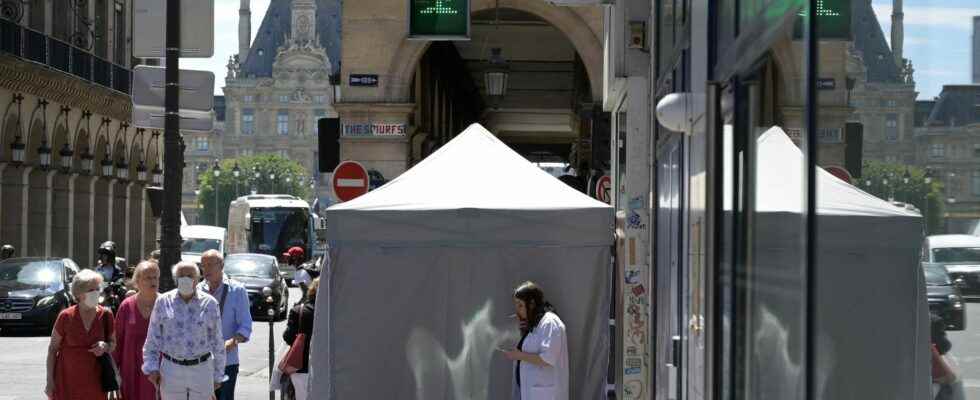Towards a return to normal in France? Several emblematic measures of the Covid-19 crisis are set to disappear from February 1. End of isolation, derogatory sick leave or even tests for contact cases. The government’s decision to ease the restriction measures responds to the health improvement experienced by the country since the beginning of 2023. “There has been a sharp decline in the epidemic for several weeks, even if it is true that the population is doing fewer tests than in previous waves”, advanced to The Express, January 25, Yannick Simonin, professor of virology at the University of Montpellier.
Indeed, the epidemic figures are green with less than 16,000 patients currently hospitalized, against nearly 25,000 at the end of December. The number of contaminations has also dropped in a month, from more than 20,000 to less than 5,000 per day on average, according to the site. covid-tracker. As for the incidence rate – i.e. the number of Covid-19 patients out of 100,000 people – it is 47 on January 27, i.e. below the alert threshold. Another positive sign: the daily deaths of Covid patients in hospital are still decreasing rapidly.
In this “favorable epidemic context”, the Directorate General of Health (DGS) announced in a press release “several developments”. Thus, “systematic isolation” of positive cases and “carrying out a test” after two days for their contacts “will no longer be required”. The executive has decided to follow the recommendations of the High Council for Public Health (HCSP)who had pleaded, before the summer, in favor of the end of these restrictions in the event of a “favorable” evolution of the situation.
The end of derogatory work stoppages
Until now, people who tested positive were asked to stay in isolation for five days. They also had to notify the “contact” status for “asymptomatic” contact persons. Little applied in practice, these precautions nevertheless remain “strongly recommended”. In addition, the recording of positive test results in the SI-DEP computer file will now be “conditioned on the prior collection of the consent of the persons concerned”. The shutdown of this epidemic monitoring tool is scheduled for the end of June. The follow-up of “contact cases”, via the “Covid contact” service managed by Health Insurance, will cease definitively on Wednesday. Its workforce had already been greatly reduced, from 6,500 full-time equivalents in 2021 to 350 in September, according to the Court of Auditors.
Also, exceptional work stoppages, without a waiting day for people who test positive for Covid-19, will no longer be possible from February 1, according to a decree published on Saturday in the Official Journal. This text “puts an end” to “the issuance of derogatory work stoppages to insured persons who are unable to continue working, including remotely”. Created at the start of the health crisis in 2020 “in order to limit the spread of the epidemic”, this system had been extended several times, most recently by the Social Security budget for 2023, which however provided for the end of this measure ” at the latest” at the end of the year. The government has therefore decided to bring forward its withdrawal.
What was the interest of this derogatory regime? Employees on sick leave for Covid-19 received daily allowances and additional salary paid by employers, without a waiting period. Note that these derogatory work stoppages had already been restricted since January 1 to people who tested positive and who could not continue to work, including teleworking, note service-public.fr. After February 1, people who test positive for Covid-19 will still be able to obtain sick leave which will be issued by a doctor if necessary. The only difference: the specialist will not be subject to the classic waiting period to obtain daily compensation from Social Security as well as the additional salary paid by the employer.
But is the lifting of anti-Covid measures coming too soon? Invited on BFMTV, epidemiologist Yves Buisson described these measures as “perfectly consistent with the current epidemiological situation.” According to the specialist, the ninth wave is in a “phase of decline” with an “inter-epidemic” circulation of the virus. From there to putting the health crisis behind us? Not quite, since certain measures are maintained in France, like the controls imposed on the territory for travelers coming from China. These will even be extended until February 15 “in view of health developments”. Also maintenance of the partial activity system for employees vulnerable to the virus. This measure has been extended for an additional month, until February 28, 2023. It allows the most vulnerable individuals to be partially paid even if they cannot work without being exposed to Covid-19.
